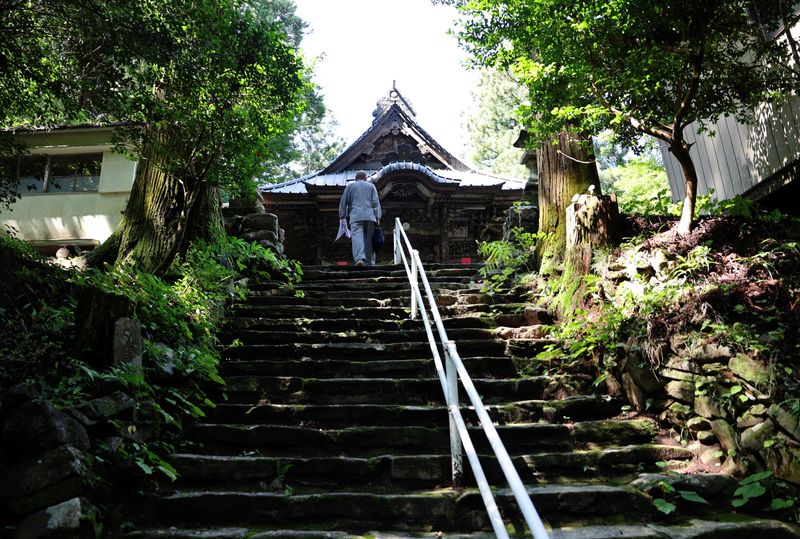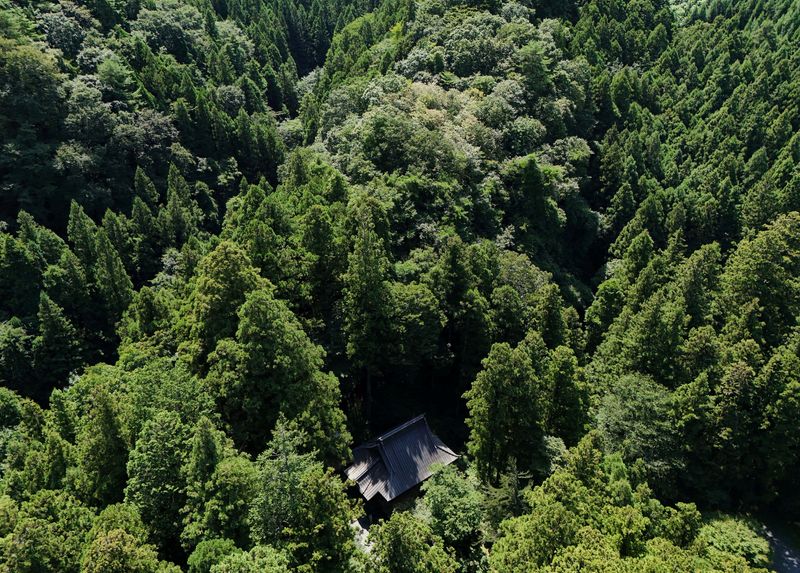By Mariko Katsumura
SANBAGAWA, Japan (Reuters) - Benmou Suzuki's dilapidated 420-year-old temple, located deep in the forest near a tiny Japanese mountain village, hardly looks like prized real estate.
Yet the monk was recently approached by two men, who said they were real estate brokers and wanted to know if he was interested in selling.
He suspects they weren't really interested in the ornate building at the trailhead of a sacred mountain, but the special tax status that comes with running a religious property.
"There are people out there who want a temple, even a mountain temple like this. In fact, considering the value of the religious corporation status, this temple could fetch quite a lot of money," said 52-year-old Suzuki.
As Japan's population falls and interest in religion declines, there are fewer people to contribute to the upkeep of the country's numerous temples and shrines. Suzuki's Mikaboyama temple, for example, is located in Sanbagawa - an area three hours drive from Tokyo with only 500 residents and which also has three other Buddhist temples, one Shinto shrine and a church.
A surge in religious properties coming up for sale has Japanese authorities worried that prospective buyers are not interested in them for heavenly purposes. Rather they fear many are out to dodge taxes or possibly even launder money.
"It's already a sense of crisis for us and the religious community," said an official at Japan's Agency for Cultural Affairs, which oversees religious sites.
Cases of temple or shrine properties being extensively repurposed have triggered public outrage. In Osaka, a temple sold in 2020 was later razed and dozens of graves were relocated to make way for a property development. In Kyoto, a case about a temple that was demolished and turned into a parking lot made headlines this year.
Owning a temple, shrine or church recognised as a religious corporation in Japan can confer sizeable tax benefits. Businesses under such corporations that offer religious services such as funerals do not have to pay taxes while other non-religious businesses also enjoy preferential tax rates. A wide range of undertakings are allowed from restaurants to hair salons to hotels.
Japan had about 180,000 religious sites with corporation status as end-2023, according to the agency's data. The number of so-called inactive corporations - such as those with no religious events for more than a year - jumped by a third to more than 4,400.
When monks or priests die without a successor, the overseeing religious group will usually appoint someone to take over or voluntarily relinquish the site's corporation status.
However, there are around 7,000 religious sites that operate independently of these groups and are considered easy to acquire, according to the agency and specialist brokers.
The cultural affairs agency said it has stepped up efforts to dissolve the corporation status of inactive religious sites to stop them from being targeted by dubious buyers.
And when big earthquakes hit, often damaging temples and shrines, agency officials visit religious groups in those areas, warning them about falling prey to such buyers.
Last year, 17 religious corporations were voluntarily dissolved and six were ordered to dissolve. The agency said the number would increase this year and next year as it ratchets up scrutiny.
It might seem easier for Japan to change its laws to more strictly control the criteria for purchasing religious sites. But the agency said the government is wary about amending laws related to religion as that could be seen as impinging on religious freedom which is guaranteed by Japan's constitution.
Reuters checks of six websites specialising in brokering the sale of religious properties showed hundreds on the market. Most are only obliquely described online with brokers saying sellers prefer to conduct sales as privately as possible.
Osaka-based broker Takao Yamamoto told Reuters interest is surging. A religious corporation licence alone can fetch 30 million yen ($210,000), he adds. Some religious sites, especially those with profitable graveyards, are advertised for millions of dollars.

"Anyone can buy independent sites as long as you have money...even foreigners can buy them. Recently, a lot of Chinese people are trying to buy them," Yamamoto said.
For his part, Suzuki says he has no intention to sell Mikaboyama temple and is working on ideas to raise funds to maintain it. "Temples are places for local people to gather and forge connections. We just can't get rid of them," he said.
